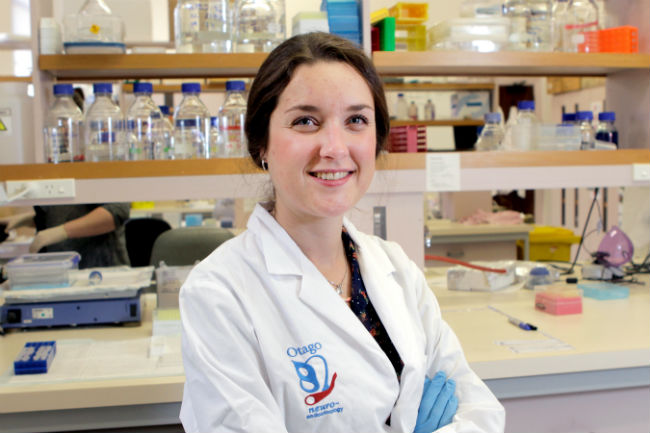
PhD candidate Pauline Campos spends her days asking how.
Working in the Herbison Lab, part of the University's Centre for Neuroendocrinology, Pauline is trying to work out how certain neurons in the brain which are involved in fertility secrete hormones.
“We know that they do, but we don't know how.”
Gonadotrophin releasing hormone (GnRH) neurons are located in the hypothalamus and control the pituitary gland production of hormones controlling reproduction.
“We have known for a long time that they do this, but the basic science of understanding 'how' is what I am looking at – it's a really old question.”
Cutting edge technology
Pauline's research involves using a new cutting-edge technology called optogenetics to activate GnRH neurons using light in order to induce hormone secretion.
In her third year of PhD study now, she is hoping to publish her results soon.
Hailing from Bordeaux, in France, Pauline has come a long way to study with Professor Herbison.
“I first came to New Zealand and to this lab on a five-month internship while I was doing my Master's degree in Bordeaux.
“It was a dream of mine to come to New Zealand since I was a kid.”
Her work progressed favourably and she ended up in the enviable position of being offered scholarships to both Otago and a French university.
“It was a hard choice as I am very far away from my family, but I knew I had a really good working relationship with Allan, and enough trust that I can feel free but still have a good supervisory relationship.
“Plus, I didn't want to say no and regret it.”
New family among the best
She hasn't regretted it: “I like my life here. Because I came here alone, I have found in the lab a second family.”
Pauline is proud of the work the Department of Physiology and in particular the Centre for Neuroendocrinology does.
“We are among the best labs in the world in endocrinology. We might be far away, but the work done here at Otago is really high quality.”
More information on the Herbison Lab, and the Department of Physiology at Otago
An e-newsletter for people interested or involved in postgraduate study at the University of Otago
Archive
Subscribe
The Otago Post is distributed via email three times a year.
Subscribe to the Otago Post.
